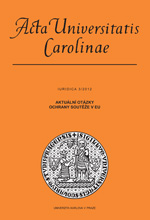Hospodářská soutěž a duševní vlastnictví v právu
Economic Competition and Intellectual Property in EU Law
Author(s): Pavel SvobodaSubject(s): Law, Constitution, Jurisprudence
Published by: Univerzita Karlova v Praze, Nakladatelství Karolinum
Keywords: competition; intellectual property; exhaustion of rights; cartel agreements; abuse of dominant position; technology transfer license refusal
Summary/Abstract: One of the EU objectives in accordance with Article 3/3 TEU is the creation of an internal market. The EU also wants to have a high level of competitiveness and to promote scientific and technical progress. According to Article 179 TFEU , the EU aims even at establishing a „European Research Area in which researchers, scientific knowledge and technology circulate freely.“ Indeed, the EU has no choice in this regard: the global economic reality and the high cost of labor in the EU forces us to these objectives, reflecting the need to build the European economy to its high value-added goods and services. Such objectives are unattainable but as functioning without competition and without IP protection. From the above it is clear that the EU must expend considerable effort for it to find a working model of coexistence between the requirement of removing trade barriers between Member States, a requirement which is also supported by competition rules, and territorially limited intellectual property rights (IPR s), both through approximation of national laws and through a purely EU legal IP instruments. Since both of these are on the way to effective co-existence of competition and IPR only of limited importance, it was CJEU case law trhat One of the objectives of the EU in accordance with Article 3/3 TEU is the creation of the internal market. The EU also wants to have a high level of competitiveness and to promote scientific and technical progress. According to Article 179 TFEU , even the EU aims to establish a „European Research Area in which researchers, scientific knowledge and technology circulate freely.“ Moreover, the EU has no choice in this regard: the global economic reality, the high cost of labor in the EU forces us to these objectives, reflecting the need to build the European economy to its high value-added goods and services. Such objectives are unattainable but as functioning without competition and without IP protection. From the above it is clear that the EU must expend considerable effort for it to find a working model of coexistence between the requirement of removing trade barriers between Member States, a requirement which is also supported by the competition rules, and territorially limited IPR , both through approximation of national laws and through a purely Union titles DV . Since both of these legal instruments are on the way to effective co-existence of competition and IPR limited importance, it was the CJEU case law that played a crucial role. Particularly the doctrines of existence v. exercise and of IPR exhaustion have limited the Member States’ competence in the IP field granted by Article 345 TFEU . This doctrine seems to be acceptable and reasonable: IPR holders retain the right to decide on the first commercialization (placing on the market) of their IP products in return for adequate compensation, but beyond this „special object of protection“ prevention of the internal market partition is to be avoided (...)
Journal: Acta Universitatis Carolinae Iuridica
- Issue Year: 58/2012
- Issue No: 3
- Page Range: 81-114
- Page Count: 34
- Language: Czech

